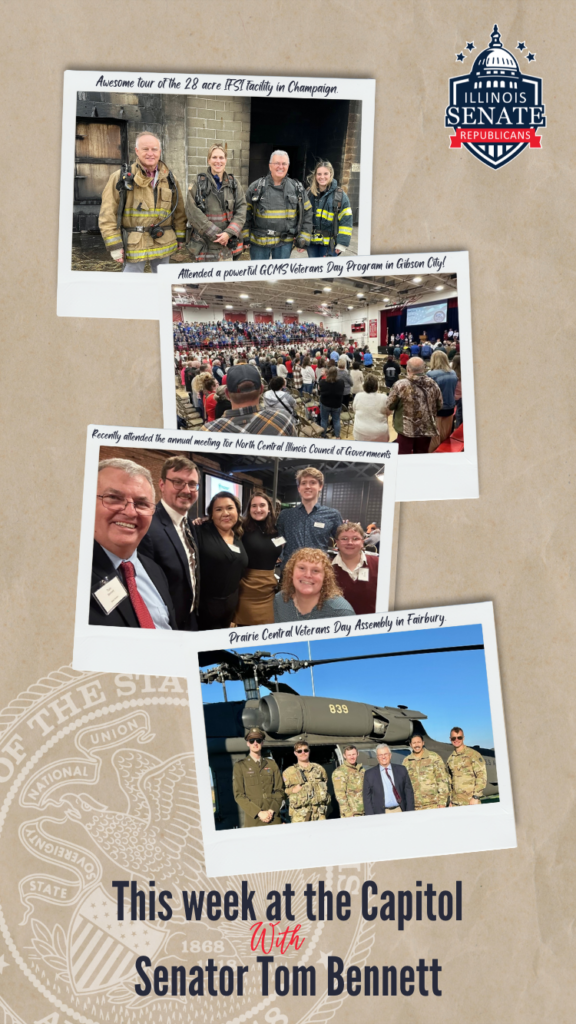
Veto Session Concludes: Senate Republicans Renew Call for No New Tax Hikes
The second and final week of the General Assembly’s Veto Session wrapped up on Thursday with few legislative items passing through either chamber.
While the Veto Session has ended, the 103rd General Assembly is expected to reconvene in early January for a “lame duck” session before the 104th General Assembly is sworn in on Wednesday, January 8.
Illinois faces a projected budget deficit of more than $3 billion in the next fiscal year. Republican legislators argue that this shortfall is due in part to a significant increase in state spending fueled by temporary federal funds.
Spending growth has been further fueled by the Governor’s initiatives, including programs for noncitizens, such as free healthcare, which cost Illinois taxpayers over $1 billion annually. To support these programs, the Governor recently enacted $1 billion in tax increases.
State Senator Bennett is urging the Governor to balance the upcoming budget without raising taxes, emphasizing that struggling Illinoisans cannot afford to cover the cost of Governor Pritzker’s self-made budget crisis.

Higher Heating Bills Expected for Illinois This Winter
As winter approaches, Illinois residents should prepare for higher heating bills compared to last year. The U.S. Energy Information Administration’s (EIA) annual winter energy outlook predicts rising natural gas and electricity costs, particularly in northern states and the Midwest.
Last winter’s record warmth kept energy costs relatively low. However, the EIA forecasts colder temperatures this year, driving up heating expenses. According to MoneyGeek, households in Illinois may see a $10 to $15 monthly increase in natural gas bills, depending on factors like home size and thermostat settings.
To help manage costs, residents can take steps such as sealing drafts, using programmable thermostats, and lowering the thermostat at night. Additionally, eligible households can apply for the Low Income Home Energy Assistance Program (LIHEAP), which helps low-income families cover energy bills. Applications are currently open.

Staying Safe This Thanksgiving
As Illinois residents prepare for the upcoming Thanksgiving holiday, whether they are cooking at home or traveling to visit loved ones, it is important to prioritize safety. Both the National Fire Protection Association (NFPA) and the American Red Cross have shared valuable tips to ensure your holiday is safe and enjoyable.
Thanksgiving is the leading day for home cooking fires in the U.S., according to the National Fire Protection Association (NFPA). To avoid accidents, stay in the kitchen while frying, grilling, or broiling food, and keep flammable items like towels and paper away from heat sources. Be prepared for emergencies by keeping a metal lid or baking sheet nearby to smother grease fires.
With over 132 million people expected to travel for Thanksgiving this year, road safety is equally important. Ensure your vehicle is in good condition, pack an emergency kit with essentials, and check the weather forecast before leaving. Avoid distractions, take breaks on long trips, and rotate drivers when necessary. If winter weather causes delays or you get stuck, stay with your vehicle, keep the exhaust pipe clear, and use a brightly colored cloth to signal for help.
A little preparation can go a long way in ensuring a safe and joyful holiday season.

Did You Know?
Thanksgiving is a time to gather with loved ones and enjoy a festive meal, but hosting the traditional feast comes with costs that have risen significantly in recent years. While there’s good news about turkey prices, the overall expense of Thanksgiving dinner remains higher than before the pandemic.
In Illinois, the average cost of Thanksgiving dinner for 10 people is $62.84, placing the state in the mid-range of affordability nationwide, according to GOBankingRates.
Turkey, often the centerpiece of the meal, is one area where shoppers might find some relief. Thanks to increased production and fewer avian flu cases, the average price of a 16-pound turkey has dropped to $25.67 this year, down from $27.47 last year. However, other Thanksgiving staples like stuffing, sweet potatoes, and pumpkin pie mix remain higher than they were before the pandemic. According to the U.S. Department of Agriculture, overall food prices have risen 25% since 2019, with Thanksgiving food items up 19%.
For families looking to save, many retailers often offer special deals, such as budget-friendly meal packages and discounts on holiday essentials. Shoppers are also encouraged to compare store-brand options with name brands to find additional savings. However, experts caution to be mindful of “shrinkflation,” a trend where package sizes are reduced while prices remain the same, which has been noted in items like frozen peas and green beans.

How much do we owe?
As of the time of this writing, the State of Illinois owes $2,037,717,987.95 to state vendors, including 19,765 pending vouchers. This figure represents the amount of bills submitted to the office of the Comptroller and still awaiting payment. It does not include debts that can only be estimated, such as our unfunded pension liability which is subject to a wide range of factors and has been estimated to be more than $139 billion. At the same time last year, the state’s accounts payable stood at a little less than $2 billion.
This Week in the 53rd District
Working full-time to represent you!


